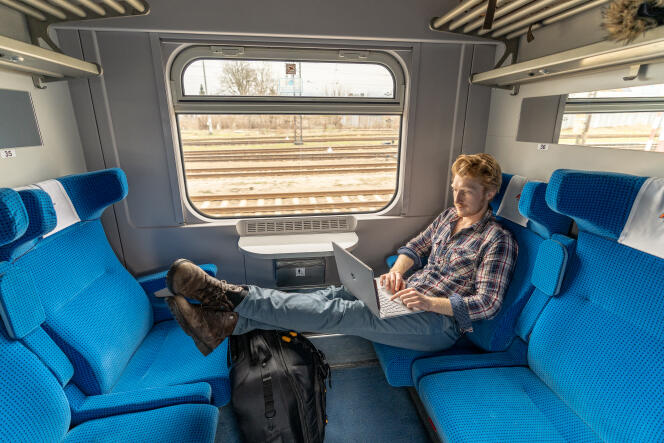


When she visits her brother in Denmark, Chiara Pellas always takes the train. For this 26-year-old Parisian, air travel is out of the question. "Yes, it takes longer and costs me a bit more – I pay around €300 for a round trip – but it allows me to reconcile my environmental conscience with my desire to travel," she explained.
She tried out different routes, both day and night, and explored different connection options: "Going via Hamburg [Germany] is best." She even convinced her parents to do the same for Christmas. "They're only doing it on the way there; they're coming back by plane. But it's a start!" said this young engineer, who has decided to devote her professional life to the train. In February, she launched a website called Mollow offering rail travel itineraries in Europe.
From specialized media platforms to agencies, train influencers, new comparison platforms and travel guides, a whole ecosystem has developed in France over the past two years around rail travel, seen as the antithesis of more polluting air travel. These initiatives are led by young entrepreneurs, often graduates of prestigious grandes écoles, or by local authorities. For instance, the Occitanie region is developing a system to encourage train tourism, featuring suggestions combining routes and activities, such as train and kayak.
Representative of this new era are the 30,000 France-Germany rail passes, distributed in June to French individuals aged 18-27, which were snapped up in a matter of hours. Moreover, the number of InterRail passes sold in France, which allow unlimited travel in Europe over a certain number of days, saw a 127% increase in 2022, compared with 2019. Additionally, the European Commission's DiscoverEU program is gaining momentum, offering InterRail passes to randomly selected French youths aged 18 (approximately 10,000 in 2023). New offers are also emerging, such as the Occitanie Rail Tour, an unlimited pass costing €10 a day. Launched in 2023 across this region, it "targets young Europeans as a priority," explained Jean Pinard, director of the Occitanie regional tourism committee.
For some, train travel has become a political act and one that NGOs such as Greenpeace are keen to capitalize on. This organization has someone specifically in charge of promoting train travel, through communication campaigns, reports, guides, and sometimes amusing on-the-ground actions. For instance, activists are sent to station platforms to greet passengers with a round of applause and the videos are later posted on social media.
You have 70% of this article left to read. The rest is for subscribers only.
